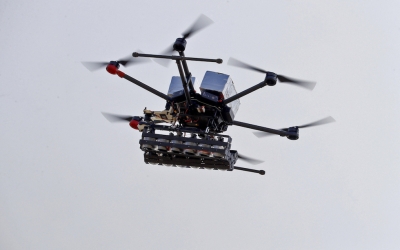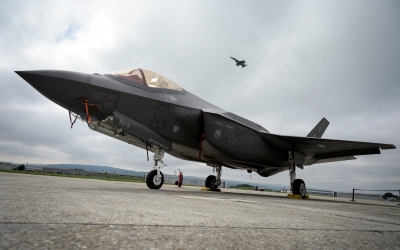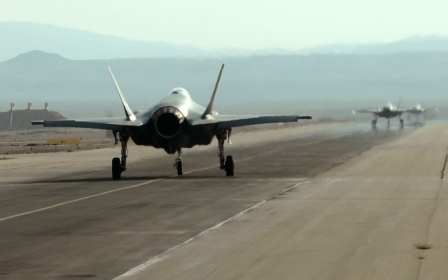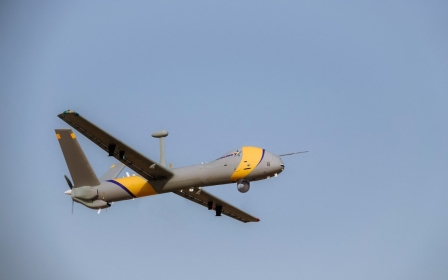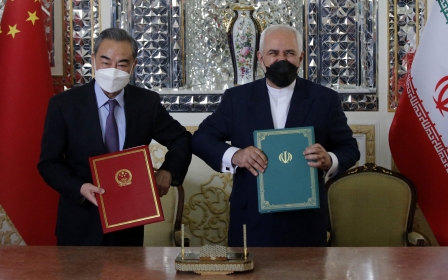Will US drone sales to the UAE clip Chinese wings in the Middle East?
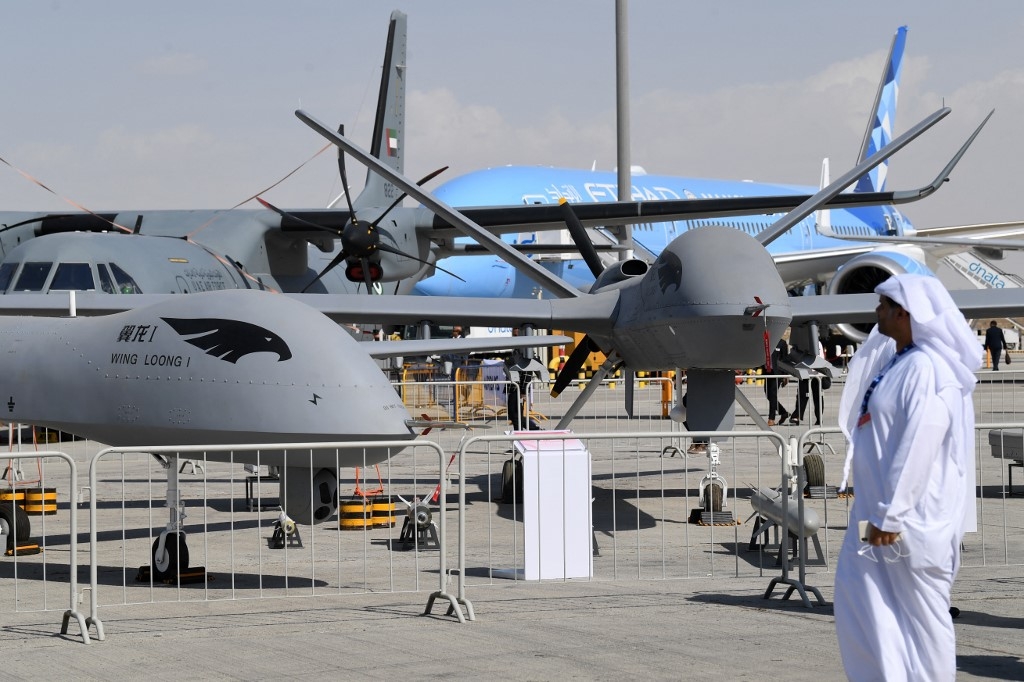
Chinese drones have become an increasingly common sight in conflict zones across the Middle East, buzzing in the skies over Iraq, Libya and Yemen.
For years, regional powerhouses, prevented from purchasing US-made drones due to strict export regulations, had turned to Beijing, a major supplier of armed drones, to address their security needs.
But last week, the Biden administration announced it was pressing forward with a hugely significant $23bn arms sale to the United Arab Emirates (UAE), a deal which could potentially see China's grip on the regional market loosen.
The deal, which was agreed by former president Donald Trump in his final days in office, includes the sale of 18 MQ-9B Reaper drones, scheduled for delivery to the oil-rich nation by the second half of this decade.
The US had been reluctant to sell armed drones to allied countries in the region, since it's a signatory of the Missile Technology Control Regime (MTCR), which, among other things, aims to prevent the proliferation of such weapons systems.
New MEE newsletter: Jerusalem Dispatch
Sign up to get the latest insights and analysis on Israel-Palestine, alongside Turkey Unpacked and other MEE newsletters
China, which never signed the export control regime, took advantage of the US absence in the market and sold armed drones to the UAE, Saudi Arabia, Iraq, and Jordan.
The UAE put Chinese-made Wing Loong II drones to combat use in Libya and Yemen. Iraq's Chinese-made CH-4B drones were also reportedly effective during Baghdad's campaign against the Islamic State group.
As of 2019, however, only one of Iraq's CH-4Bs was reportedly mission capable. That same year, Jordan sought to sell off its CH-4Bs, possibly indicating that Amman regretted its purchase.
The Trump administration, frustrated that the US was losing out in this growing and lucrative market, reinterpreted the MTCR in a way that permitted the US to sell armed drones and compete with China.
Increased drone options in the Middle East
Still, analysts are doubtful that either the UAE sale or future US drone exports to the region will push Beijing out of the market.
"I do not think this marks the end of China's drone sales in the region," James Rogers, of the Center for War Studies at the University of Southern Denmark (SDU), told Middle East Eye.
"Although China's CH-4 drones have a bad reputation for reliability, the Wing Loong IIs, equipped with Blue Arrow 7 missiles, have been used to destructive effect over a prolonged period in Libya," he said.
"This perception, combined with the competitive price advantage, will ensure that the Wing Loong II is an affordable option for any state that remains outside of the US's preferred list of buyers."
Thomas Abi-Hanna, Stratfor's global security analyst at RANE, also noted that the Wing Loong II drones in the UAE arsenal had proven to be "an effective tool".
"Jordan has not been able to utilise armed drones as much, simply because, unlike the UAE, it has not been directly involved in an active conflict over the last few years," Abi-Hanna told Middle East Eye.
He also pointed out that Saudi Arabia's interest in other sources for drone technology "isn't necessarily an indication that it no longer has an interest in Chinese drones, simply that it is looking for additional options".
Saudi Arabia has recently expressed interest in Turkey's drones, according to Turkish President Recep Tayyip Erdogan, and Riyadh will reportedly begin co-producing the Turkish-built Karayel-SU medium-altitude, long-endurance drone in the near future.
The UAE may also seek Israeli drones, now the countries have established relations.
"Israel and the UAE have already cooperated on a number of security and intelligence matters, even before the two countries normalised relations," Abi-Hanna said.
"Therefore more cooperation, to include the potential purchase of drones, will be an option on the table for the UAE as it continues to establish more concrete commercial and military ties with Israel."
More generally, he added, as with any arms purchase, "the buyer will want to find the most cost-effective and efficient equipment that it can find, which necessitates expanding the potential pool of vendors".
US policy unclear
Both analysts warn that the growing number of options for Middle East states to acquire armed drones could fuel further conflict and destruction in the region.
Rogers said it was not surprising that the Biden administration would leave its predecessor's reinterpretation of the MTCR in place, since it "reflects the US determination to maintain a leadership position in the drones arms race against China".
Nevertheless, he argued this approach by Washington missed the bigger picture and would likely "exacerbate the problem of drone proliferation globally and in the longer term".
In a piece co-authored with Agnes Callamard, Rogers argued for the urgent establishment of a Drone Technology Control Regime (DTCR) to prevent the proliferation of these lethal weapons from spiraling completely out of control.
'Israel, Turkey, the US, and even Russia, have some of the most advanced military drone systems on the market'
- James Rogers, University of Southern Denmark
They call for the implementation of "a transparent, multilateral process to develop robust standards for the design, export, and use of drones".
That process should include stricter controls on drone technology transfer and "clear criteria to prevent irresponsible transfers".
Furthermore, drone sales "must include civilian protection and adherence to international human rights and humanitarian law" and states should work together within a DTCR framework to establish "a dedicated process of operational end-use monitoring to report transparently on the outcome of drone strikes and their impact on civilians and so-called 'targets'".
Abi-Hanna noted that while the US reinterpretation of the existing MTCR opens up its potential to compete in the Middle East drone market, the "concrete impact of the policy" remains unclear.
Middle East states will undoubtedly welcome more suppliers entering the market since "it will drive those suppliers to make the most effective and cost-efficient drones possible in a bid to one-up their competitors".
"However," he said, "the specific US policy directive on this issue is still unclear and could take months or even years to materialise fully and/or have an impact on drone purchases by Middle Eastern governments."
'Drone conflicts'
Nevertheless, Abi-Hanna anticipates an increasing demand for larger numbers of surveillance and attack drones in the Middle East. The proliferation of drones and the accompanying technology in the region will make it cheaper and more cost-effective for these states to deploy such systems.
Drones are much cheaper and less risky to deploy than other military aircraft. Unlike fighter pilots, it doesn't take very long to train drone operators, who are also not exposed to the same risks in combat operations.
Rogers concluded by pointing out that China was already far from being the only drone exporter to the Middle East.
"Israel, Turkey, the US, and even Russia, have some of the most advanced military drone systems on the market," he said.
"All of this will sadly ensure that any future conflicts will likely be 'drone conflicts' involving drones and the lethal threat of death from above for civilians, political leaders, and military personnel," he added.
"It is for this reason we need a DTCR."
Middle East Eye delivers independent and unrivalled coverage and analysis of the Middle East, North Africa and beyond. To learn more about republishing this content and the associated fees, please fill out this form. More about MEE can be found here.


